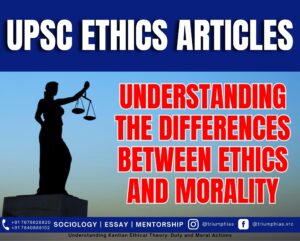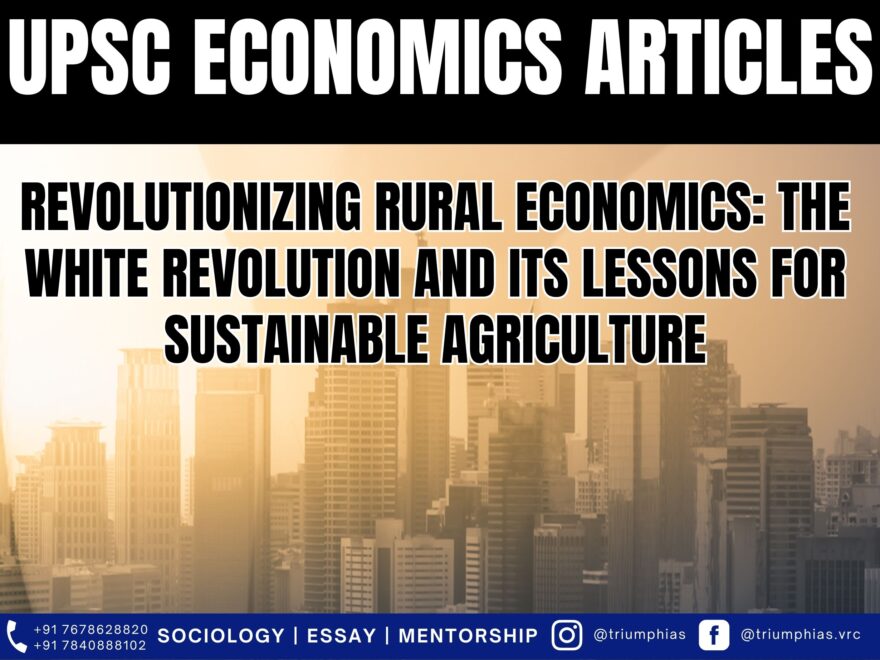White Revolution
(Relevant for Economics Section of General Studies Paper Prelims/Mains)

White revolution
The White Revolution, also known as Operation Flood, stands as the world’s most extensive dairy development initiative. In the span of three decades, Operation Flood played a pivotal role in doubling the per capita milk availability in India, thereby establishing dairy farming as the country’s most significant self-sustaining source of rural employment.
The triumph of the White Revolution can be credited to the cooperative approach, famously known as the Amul model. The Amul Model empowered farmers by granting them direct authority over the resources they generated, enabling them to steer their individual progress and market their products effectively.
- Monoculture Farming: The Green Revolution primarily concentrates on cultivating food grains, including wheat, rice, jowar, bajra, and maize, among others. However, it is wheat and rice that have reaped the most benefits.
- Disparities among Regions: The adoption of Green Revolution technology has contributed to growing economic disparities both at regional and intra-regional levels.
- The regions that have benefitted the most are Punjab, Haryana, and western Uttar Pradesh in the north, as well as Andhra Pradesh and Tamil Nadu in the south.
- Favouring Larger Landowners: Large landowners have been the primary beneficiaries of this revolution due to their financial capacity to invest in farm equipment, superior seeds, fertilizers, and the ability to ensure consistent irrigation for their crops.
- Hidden Unemployment: The mechanization of farming under the Green Revolution has resulted in widespread unemployment among agricultural labourers in rural areas.
- Environmental Degradation: The Green Revolution has led to the deterioration of the Earth’s natural environment. This degradation has occurred as a result of the application of modern technology and management practices aimed at achieving economic growth.
Lessons Learnt From White Revolution
- Localized Approach: Instead of relying solely on global or national-scale solutions, we should adopt localized approaches similar to those employed in the White Revolution. For instance:
- Utilizing Local Resources: Local resources should serve as the primary assets for farming endeavors.
- Cooperative Farming: Implementing cooperative management principles in natural farming can lead to more effective economic policies and improved management practices, promoting inclusivity and environmental sustainability.
- Boosting Food Processing Industries: Among agricultural products, milk is relatively stable due to its higher share of processing compared to production. The AMUL model, for instance, relies on substantial milk procurement from farmers’ cooperatives. It involves processing and storing excess milk in skimmed milk powder form during peak production seasons for use during lean periods. Milk distribution is conducted through a well-organized retail network. Therefore, the government should actively support the development of food processing units in agriculture. The recent announcement to establish an additional 10,000 Farmer Processing Organizations, along with the Agriculture Infrastructure Fund, is promising but should be swiftly implemented.
- Market Reforms: The success of Operation Flood highlights the necessity for market reforms, including changes in Agricultural Produce Market Committees (APMC), infrastructure enhancements in existing APMC markets, and the promotion of contract farming.
The essence of the success of the white revolution lies in its democratic economic governance. According to which enterprise must be of the people, for the people, and governed by the people too. In this context, it is important that lessons learnt from the white revolution should be deployed to re green the green revolution.
Sample Question for UPSC Sociology Optional Paper:
-
Question 1: What sociological implications did the White Revolution have on India’s rural economy?
Answer: The White Revolution empowered rural communities through cooperative farming, providing a self-sustaining source of income and employment, thereby reducing economic inequalities and fostering community development.Question 2: How does the Amul Model reflect principles of democratic economic governance?
Answer: The Amul Model promotes democratic economic governance by granting farmers direct control over their resources, allowing them to make individual progress and market their products effectively, thus embodying the principles of economic democracy.Question 3: How can the lessons from the White Revolution be applied to address the environmental degradation caused by the Green Revolution?
Answer: Lessons from the White Revolution advocate for localized, cooperative, and sustainable farming practices, which can serve as a model to mitigate the environmental impact of agricultural practices, particularly those that arose from the Green Revolution.Question 4: What role do food processing industries play in the sustainability and economic viability of agricultural products, as seen in the White Revolution?
Answer: Food processing industries enhance economic viability by stabilizing agricultural products, allowing for effective storage and distribution, as exemplified by the Amul model’s approach to milk processing and distribution.Question 5: How does the White Revolution offer insights into addressing hidden unemployment caused by agricultural mechanization?
Answer: By promoting cooperative farming and diversifying agricultural practices, the White Revolution provides a pathway to address hidden unemployment by engaging the community in different aspects of farming and food processing.
Related Blogs …
 |
 |
To master these intricacies and fare well in the Sociology Optional Syllabus, aspiring sociologists might benefit from guidance by the Best Sociology Optional Teacher and participation in the Best Sociology Optional Coaching. These avenues provide comprehensive assistance, ensuring a solid understanding of sociology’s diverse methodologies and techniques.
White revolution, White revolution upsc, White revolution in India upsc, White revolution act, White revolution amul, White revolution assignment, White revolution year, White revolution in which five year plan, White revolution pdf, White revolution meaning, White Revolution, Operation Flood, Amul Model, Rural Economy, Cooperative Farming, Sustainable Agriculture, Food Processing, Market Reforms, Economic Governance, Green Revolution

Choose The Best Sociology Optional Teacher for IAS Preparation?
At the beginning of the journey for Civil Services Examination preparation, many students face a pivotal decision – selecting their optional subject. Questions such as “which optional subject is the best?” and “which optional subject is the most scoring?” frequently come to mind. Choosing the right optional subject, like choosing the best sociology optional teacher, is a subjective yet vital step that requires a thoughtful decision based on facts. A misstep in this crucial decision can indeed prove disastrous.
Ever since the exam pattern was revamped in 2013, the UPSC has eliminated the need for a second optional subject. Now, candidates have to choose only one optional subject for the UPSC Mains, which has two papers of 250 marks each. One of the compelling choices for many has been the sociology optional. However, it’s strongly advised to decide on your optional subject for mains well ahead of time to get sufficient time to complete the syllabus. After all, most students score similarly in General Studies Papers; it’s the score in the optional subject & essay that contributes significantly to the final selection.
“A sound strategy does not rely solely on the popular
Opinion of toppers or famous YouTubers cum teachers.”
It requires understanding one’s ability, interest, and the relevance of the subject, not just for the exam but also for life in general. Hence, when selecting the best sociology teacher, one must consider the usefulness of sociology optional coaching in General Studies, Essay, and Personality Test.
The choice of the optional subject should be based on objective criteria, such as the nature, scope, and size of the syllabus, uniformity and stability in the question pattern, relevance of the syllabic content in daily life in society, and the availability of study material and guidance. For example, choosing the best sociology optional coaching can ensure access to top-quality study materials and experienced teachers. Always remember, the approach of the UPSC optional subject differs from your academic studies of subjects. Therefore, before settling for sociology optional, you need to analyze the syllabus, previous years’ pattern, subject requirements (be it ideal, visionary, numerical, conceptual theoretical), and your comfort level with the subject.
This decision marks a critical point in your UPSC – CSE journey, potentially determining your success in a career in IAS/Civil Services. Therefore, it’s crucial to choose wisely, whether it’s the optional subject or the best sociology optional teacher. Always base your decision on accurate facts, and never let your emotional biases guide your choices. After all, the search for the best sociology optional coaching is about finding the perfect fit for your unique academic needs and aspirations.
To master these intricacies and fare well in the Sociology Optional Syllabus, aspiring sociologists might benefit from guidance by the Best Sociology Optional Teacher and participation in the Best Sociology Optional Coaching. These avenues provide comprehensive assistance, ensuring a solid understanding of sociology’s diverse methodologies and techniques. Sociology, Social theory, Best Sociology Optional Teacher, Best Sociology Optional Coaching, Sociology Optional Syllabus.
Best Sociology Optional Teacher, Sociology Syllabus, Sociology Optional, Sociology Optional Coaching, Best Sociology Optional Coaching, Best Sociology Teacher, Sociology Course, Sociology Teacher, Sociology Foundation, Sociology Foundation Course, Sociology Optional UPSC, Sociology for IAS,
Follow us :


https://t.me/VikashRanjanSociology
Find More Blogs
|
Scope of the subject and comparison with other social sciences |
|||
|
|
|
|
Modernity and social changes in Europe |

